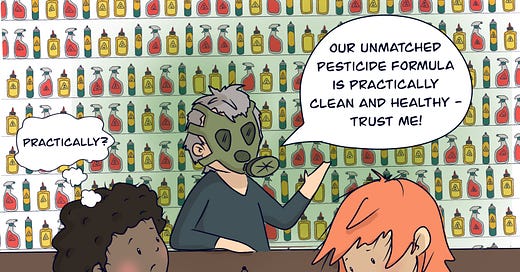Pesticides to be more effective at attacking our planets immune system, by 2050
And the cycle continues as our crops and insects become more tolerant to pesticides, chemists could be 'forced' to intensify the chemicals effectiveness
“Pesticides contribute to climate change throughout their lifecycle via manufacturing, packaging, transportation, application, and even through environmental degradation and disposal. Importantly, 99% of all synthetic chemicals —including pesticides — are derived from fossil fuels, and several oil and gas companies play major roles in developing pesticide ingredients.” (1)
States PAN (Pesticide Action Network) in their 2022 Pesticides and Climate Change: A Vicious Cycle report.
They continue to explain that there is a concerning trend where the reduction of synthetic pesticide use is being overlooked as a climate change solution. While pesticides indeed contribute to greenhouse gas emissions and exacerbate the vulnerability of agricultural systems to climate change, there's a lack of emphasis on reducing their usage in mainstream climate change mitigation strategies.
PAN in-fact criticise the promotion of synthetic pesticide use as a climate change mitigation strategy by industrial agriculture interests, implying that such an approach is misguided and potentially harmful.
One of the fears with continued and extensive use is that it “can contribute to the development of resistance in target pest populations. As pests evolve to withstand pesticides, farmers may need to use larger quantities or more potent formulations, leading to a cycle of escalating pesticide use and diminishing effectiveness” (2) As mentioned in The Evolution of Resistance to Pesticides report as part of the Annual Review of Ecology and Systematics of 2003.
This means we could potentially be experiencing higher volumes or denser pesticide formulas on our crops in order to get the same harvesting effects.
Additionally PAN UK analysed the results of government testing of pesticide residues found in the produce given out through the SFVS between 2005 and 2016. “In total, we found residues of 123 different pesticides, including 43 suspected endocrine (hormone system) disruptors”
They go on to explain that “pesticide residue is the detectable trace of any pesticide that remains on or in food. Due to the systemic nature of many pesticides, residues are contained within the body of the produce itself and therefore washing the surface won’t remove them.” (3)
With the potential increased use of these poisons, not only house holds who don’t have the ‘luxury’ of buying organic are put at a greater risk, but also our planets immune system will continue to be attacked by these potentially ever intensifying chemicals.
1 – www.panna.org/wp-content/uploads/2023/02/202308ClimateChangeEng.pdf
2 – www.researchgate.net/publication/_The_Evolution_of_Resistance_to_Pesticides
3 – www.pan-uk.org/site/wp-content/uploads/Food_for_thought_FINAL-4th-Sept.pdf




